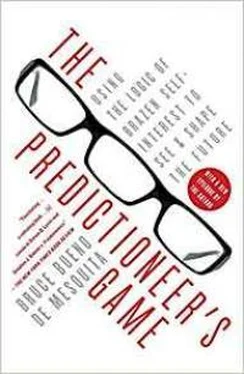1

WHAT WILL IT TAKE TO PUT YOU IN THIS CAR TODAY?
“GAME THEORY” IS a fancy label for a pretty simple idea: that people do what they believe is in their best interest. That means they pay attention to how others might react if they choose to do one thing or another. Those “others” are anyone believed to be a prospective supporter or opponent. Looking at how their interests intersect or collide is basic to assessing potential outcomes of decision making. To get a good grip on what people are likely to do requires first approximating what they believe about the situation and what they want to get out of it. By estimating carefully people’s wants and beliefs, anyone can make a reliable forecast of what each and every one of them will do. And if you can predict what will happen, then you can also predict what will happen if you alter what people believe about a situation. This is, in short, how we can use the same logic both for prediction and for engineering the future.
I’ll provide a more detailed examination of game theory in the next two chapters, but first, as promised, let me illustrate what I’m talking about with the example of how best to buy a new car.
A new car purchase is a costly bargaining experience for most of us because most of us are bad at it. A little strategic reasoning can go a long way to improve the experience. If you follow the ideas here, you will not only have a happier time buying a car, you’ll also pay a lot less money.
New cars are mostly bought in one of two ways. Most of us go to a dealership, test-drive a vehicle, maybe fall in love with it, and engage in a most unpleasant negotiation over the price. A smaller number of us hate that experience enough that we buy cars through the Internet. This usually means getting price bids from a few local dealers and then going to one of them to get the car. That’s slightly better, but there’s yet a better way to buy cars that I urge you to try.
What’s wrong with the most popular means of car shopping? Pretty much everything. To start with, you, the buyer, invest your time, and probably the time of some family members as well, at a car dealership. The salesperson knows that few people enjoy dealing with them. They know that they rate near the bottom of anybody’s scale of occupational trustworthiness. (The Jobs Rated Almanac weights occupations by numerous factors and reports that auto sales ranks 220th out of 250 occupations. 1Apparently it’s worse to be a taxi driver, cowboy, or roustabout, but not by much.) But there you are subjecting yourself to the salesperson’s pitch, standing before a car dealer in his or her place of business, feeling compelled to haggle over the price, probably to your embarrassment and certainly to your disadvantage. The whole time you’re talking to the dealer you’re revealing information that sets you up to pay too much.
Being there is what game theorists call a “costly signal.” It’s a costly signal because your expenditure of time and energy announces that you want to buy, that there’s a good chance you’ll buy from the dealership you’re visiting rather than go elsewhere, and, especially if you have kids with you, that you want to get out of there as quickly as possible. That first step, then, your simply being there , translates into strengthening the salesperson’s hand in getting a good price. They believe you’re ready to buy, and you’ve done precious little to dissuade them. Score one for the dealer, none for you.
Now as it happens, costly signals are usually good things for you. They show you’re serious about what you are saying and doing. That can give you credibility, as we will see in later chapters. Unfortunately, costly signals can have just the opposite effect when you’re a shopper. They announce your eagerness to buy, and that makes it tough to get a good deal.
The situation was bad enough when you walked in the dealership door, but it only gets worse once a conversation begins. Although you’ve probably done homework online and know something about the invoice price of the car you want, there’s a great deal you don’t know that the dealer does know. When you say you want a gray car, or a blue one, or yellow, you don’t know whether you’ve picked the hottest color in the greatest demand or a color that hardly anyone wants. You may not even know that there can be a price difference of many hundreds of dollars between choosing, say, red or yellow because the dealer treats that choice just the way options are treated—as one more place to pile on costs. You don’t know enough about the local supply and demand to have a good retort when Pat, the salesperson, tells you the vehicle you want is in short supply. Translation: The invoice price on the Internet? Forget it—that’s not going to happen for the car you want. Score another point for the dealer, and still none for you.
As anyone who’s ever bought a new car knows, Pat will almost certainly ask you, “What will it take to put you in this car today?” Now you’re cornered. If you name a really low price, Pat, who has been playing up to you, looks hurt or loses interest, or maybe even becomes just a little rude. Control of the discussion is now fully out of your hands. You feel bad about the lowball offer, you want to establish your good faith, and so you come back with a number close to what you’re actually prepared to pay because you want to keep the conversation going. So Pat has gotten you to put a credible price on the table. Now, after praising the offer, Pat announces that this is a price that can be taken to the sales manager for approval. This is when the price gets jacked up a little bit more to close the deal. Rather than worrying about what the sales manager will say as you sit at Pat’s desk, sipping dishwater-thin coffee from a paper cup, ask yourself, Is it possible that Pat does not know the vehicle’s price?! Hard to believe, since that’s what Pat does all day—sell cars.
You have now given Pat almost all the important information that was in your hands. Meanwhile, you have learned very little about the true state of the market. You may believe that Pat is working on your behalf with the sales manager, telling the manager what a good customer you are and how nice your family is. My guess is that they talk about last night’s football game or how lousy that coffee is, and then Pat emerges with a price.
After some haggling over minor details, hands are shaken and a deal is struck. You feel efficacious. You got a “good” price that you will boast about to your friends. Pat assures you that this is so—and maybe it is, but then the nature of any sale is that the buyer and the seller are both happy with the price; otherwise there’s no deal. You really do not know that you’ve gotten the best price for the car, just as the salesperson does not know that you paid the most you were prepared to pay. But Pat controlled the agenda, revealed little, and worked your price up. That is one more point for the dealer and maybe, just maybe, one for you too. The winner: the dealer by at least 3 or 4 to 1.
Now, the Internet can work much better. There is lots of useful information to be had, including information that car dealers don’t want buyers to know. It’s a great source for finding out a car’s invoice price, for example, and Internet car purchase services generally guarantee that you’ll be contacted by two or three dealers who at least know that you’ve already done some online comparison shopping. Still, making a deal requires going to a dealership. Once you are in the dealership, everything that happens in the first way of buying cars is now going to happen again, except that Pat already knows you’re interested at the price quoted online. Maybe Pat says the exact car you asked about isn’t available. Sure, it could be special-ordered, but that will take a long time. Maybe Pat offers you a seemingly good deal on a different car and the information gained on the Internet fades in importance. How about a similar car with a few extras—maybe a sunroof, a super-duper sound system, special trim, whatever—that you really don’t want? At least that car is on the dealer’s lot, if only for just a little bit more money. Or maybe you close the deal on the car you asked about at the price quoted online. Well, you’re probably closer to the lowest price the dealer will take, but in all likelihood you are not there. After all, they don’t quote a price to you that they expect you to bid up from; they anticipate you’re going to look for ways to cut their price. It must have some give left in it.
Читать дальше













